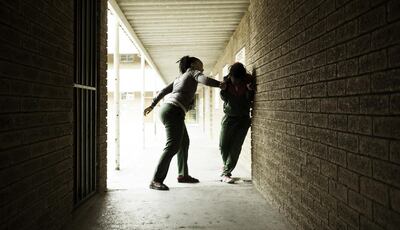A study of pupils at four UAE schools has found that certain categories of children are more likely to bully their peers online.
The work, which analysed the behaviour of ninth and tenth year pupils (14-to-16 years old) in Al Ain, found there were more instances of cyberbullying carried out by children who were looked after for long periods by nannies and domestic workers.
The Al Ain University researchers behind the study said it was clear that a lack of guidance could lead to bad behaviour.
When parents were absent for much of the day, particularly mothers, researchers said, behaviour appeared to deteriorate.
“Working mothers are under an enormous workload with long working hours,” they wrote.
“Additionally, domestic servants allow the children they supervise to use the technology for long periods of time, with the absence of real and direct supervision by the mothers.”
In another key conclusion, the researchers found there was more cyberbullying by children whose parents were not university graduates.
A third finding was that male pupils were more likely than females to carry out cyberbullying.
The study’s first author, Dr Khawlah Al Tkhayneh, an assistant professor in the College of Education at Al Ain University, said this detail reflected wider gender trends in society.
Online bullying is carried out through multiple channels, according to Dr Al Tkhayneh, including by text message and on Facebook or Twitter.
Fortunately, the overall level of cyberbullying was described as “low to medium” so, while distressing to those who fall victim, it was less prevalent than expected.
A recent poll conducted among Emirati university pupils for the Mohamed bin Zayed Majlis for Future Generations found that 11 per cent of those who said their mental health was poor or not good, blamed it on bullying.
Dr Al Tkhayneh said societal awareness of the problem had increased and “many governments” had implemented laws to deter cyberbullying.
She cited the UAE federal law from 2012, plus 2016 amendments, which covered cyber crimes, with punishments including imprisonment and fines.
There was a surge in online bullying around the globe during the pandemic.
According to the Cybersmile Foundation, an anti-bullying non-profit organisation, Australia’s eSafety Commissioner reported a 50 per cent increase in incidents of cyberbullying during the first three weeks of the country’s lockdown.
In January, the UAE launched a digital well-being policy to tackle online trolls.
The strategy included an online behaviour code to be taught to Emiratis in government schools from nursery to Grade 12.
Jeff Evans, managing director of Learning Key, an education consultancy in the UAE, said there was already a series of legal and regulatory measures in place that should give schools the power to tackle bullying robustly.
“The UAE introduced an excellent moral education to all Abu Dhabi schools in 2018, which includes pillars and values such as tolerance, respect and empathy,” he said.
“School leaders and teachers have worked steadily to integrate these into the curriculum and encourage pupils to fully reflect on their behaviour and attitudes.”
Mr Evans, who works with private schools offering American, British, IB and Indian curricula, said in recent years the “online behaviour of a very small minority of pupils has become a concern”.
“Despite most good schools providing online safety training and codes of conduct, which pupils and parents sign up to, a few children and teens can be tempted to behave online in a way they would never do face to face on campus. Bullying, name calling or spreading rumours are all hurtful,” he said.
The new study, published in Balkan Social Science Review, was based on questionnaires filled in by just under 250 pupils, 65 per cent of them Emirati.
Titled The degree of cyberbullying according to gender and social ecology in the UAE, it was also written by Dr Khaled Nser, an associate professor in Al Ain University's College of Education.









